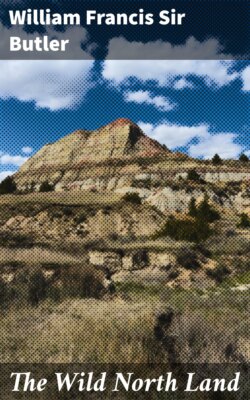Читать книгу The Wild North Land - William Francis Sir Butler - Страница 4
На сайте Литреса книга снята с продажи.
PREFACE.
ОглавлениеTable of Contents
People are supposed to have an object in every journey they undertake in this world. A man goes to Africa to look for the Nile, to Rome to see the Coliseum or St. Peter’s; and once, I believe, a certain traveller tramped all the way to Jerusalem for the sole purpose of playing ball against the walls of that city.
As this matter of object, then, seems to be a rule with travellers, it may be asked by those who read this book, what object had the writer in undertaking a journey across the snowy wilderness of North America, in winter and alone? I fear there is no answer to be given to the question, save such as may be found in the motto on the title-page, or in the pages of the book itself.
About eighteen months ago I was desirous of entering upon African travel. A great explorer had been lost for years in the vast lake-region of Southern Central Africa, and the British Nation—which, by the way, becomes singularly attached to a man when he is dead, or supposed to be dead—grew anxious to go out to look for him.
As the British Nation could not all go out at once, or together, it endeavoured to select one or two individuals to carry out its wishes.
It will be only necessary to state here, that the British Nation did not select the writer of this book, who forthwith turned his attention from African tropic zones to American frigid ones, and started out upon a lonely cruise.
Many tracks lay before me in that immense region I call “The Wild North Land.” Former wandering had made me familiar with the methods of travel pursued in these countries by the Indian tribes, or far-scattered fur-hunters. Fortunate in recovering possession of an old and long-tried Esquimaux dog—the companion of earlier travel—I started in the autumn of 1872 from the Red River of the North, and, reaching Lake Athabasca, completed half my journey by the first week of March in the following year. From Athabasca I followed the many-winding channel of the frozen Peace River to its great cañon in the Rocky Mountains, and, journeying through this pass—for many reasons the most remarkable one in the whole range of the Rocky Mountains—reached the north of British Columbia in the end of May. From thence, following a trail of 350 miles through the dense forests of New Caledonia, I emerged on the 3rd of June at the frontier station of Quesnelle on the Frazer River, still 400 miles north of Victoria.
In the ensuing pages the story of that long tramp—for it was mostly performed on foot—will be duly set forth. Written by camp fire, or in cañon, or in the little log-house of a northern fur fort, when dogs and men rested for a day or two in the long icy run, that narrative will be found, I fear, to bear many indications of the rough scenes ’mid which it has been penned; but as, on a former occasion, many critics passed in gentle silence over the faults and failings of another story of travel in the Great Lone Land, so now it may be my fortune to tell to as kindly an audience, this record of a winter’s walk through more distant wilds—for in truth there has been neither time for revision nor correction.
Fortune, which eighteen months ago denied me African adventure, offers it now with liberal hand.
I reached the Atlantic from the Pacific shore to find an expedition starting from England against Ashantee; and long ere this story finds a reader I hope to be pushing my way through the mangrove swamps which lie between the Gold Coast and Coomassie. To others even must fall the task of correcting proofs, while I assume my part in the correction and revision of King Koffi Kancalli, and the administration to his subjects of that proof of British prowess which it has been deemed desirable to give them.
Meantime, my old friends Chief Kar-ka-konias, Kalder, and Cerf-vola, will be absent from this new field; but, nevertheless, there will be present many companions of former travel, and one Chief under whose command I first sought the Great Lone Land as the threshold to remoter regions.
W.F. Butler.
London,
September 21st, 1873.
